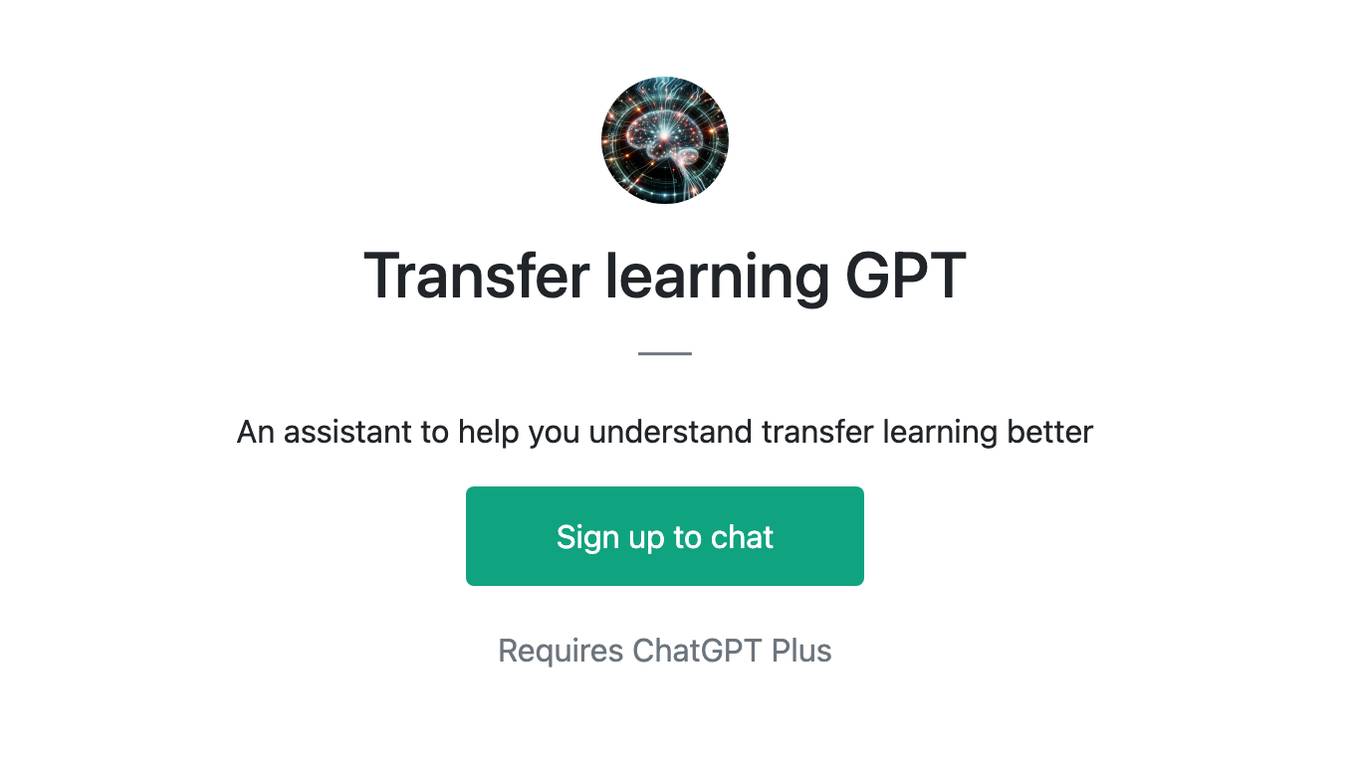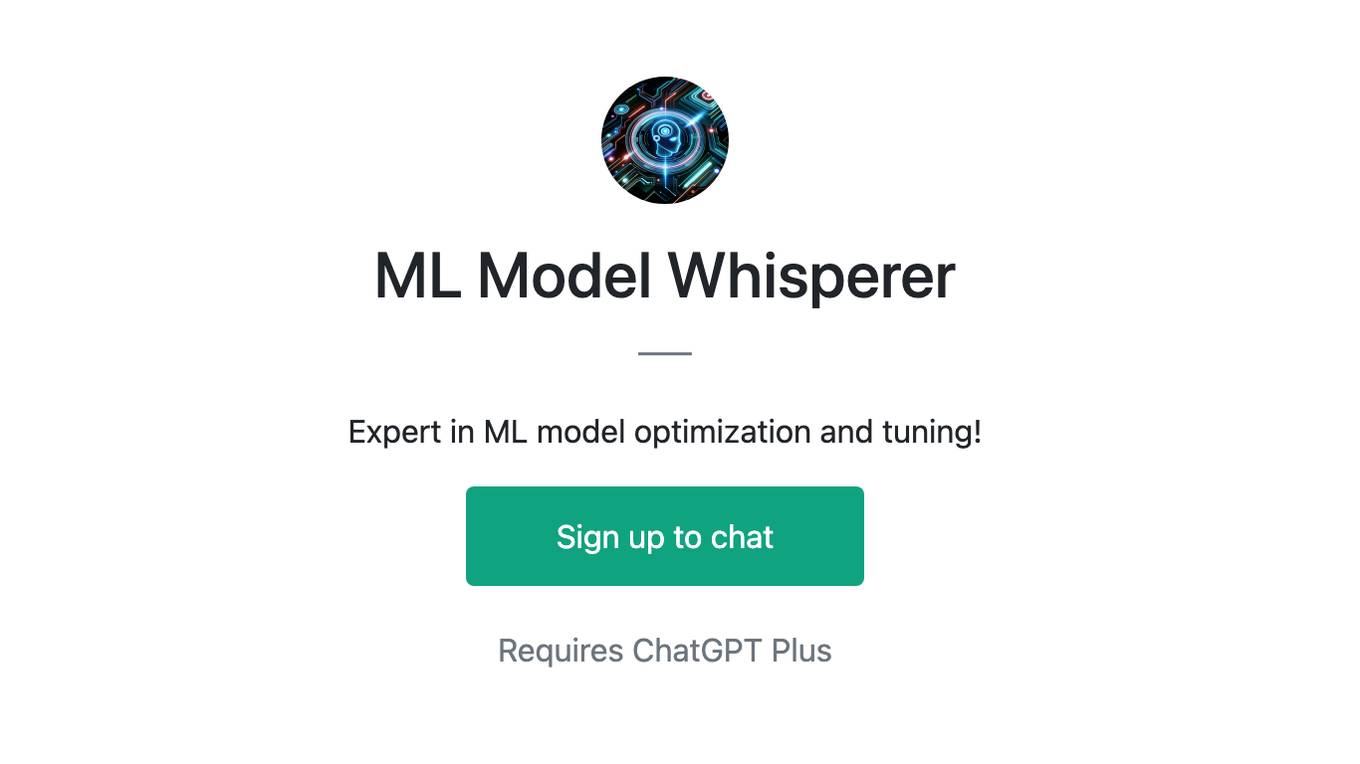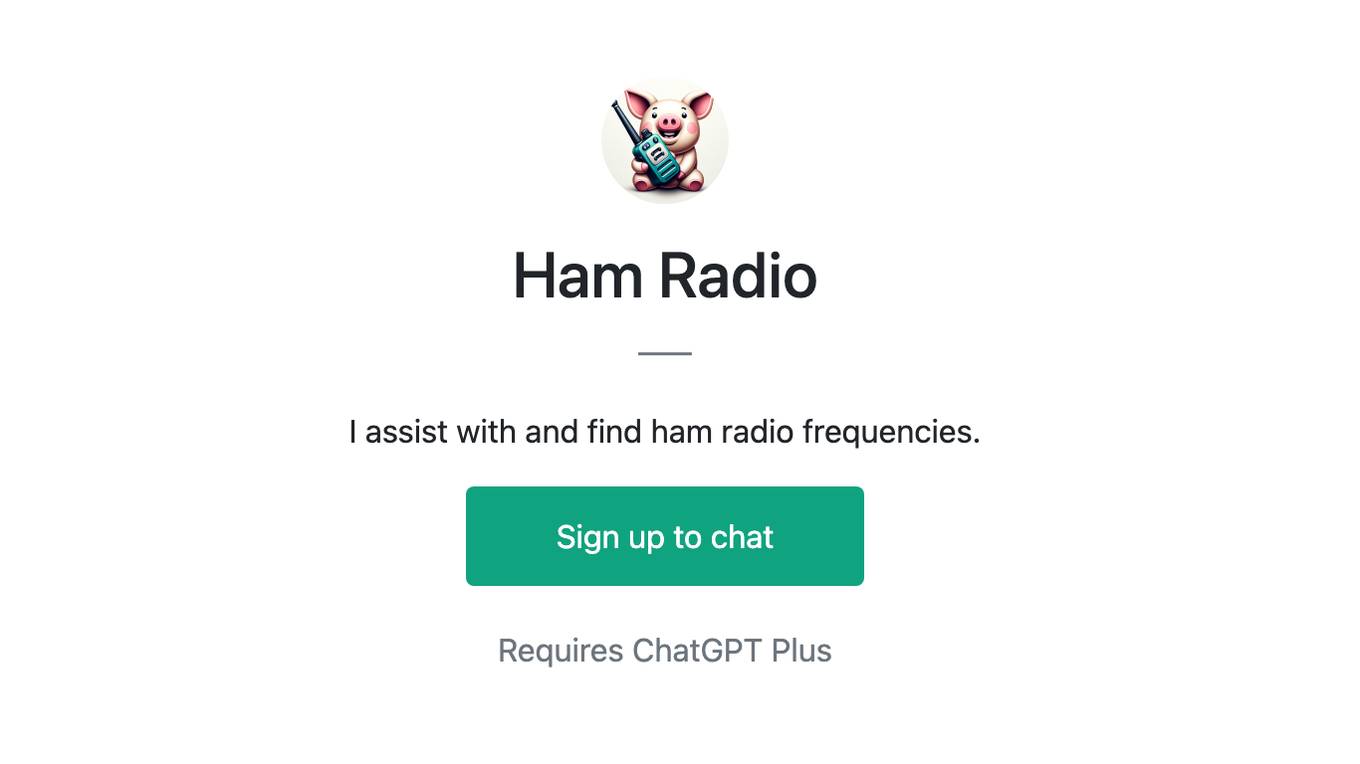Best AI tools for< Tune Performance >
20 - AI tool Sites

Keebo
Keebo is an AI tool designed for Snowflake optimization, offering automated query, cost, and tuning optimization. It is the only fully-automated Snowflake optimizer that dynamically adjusts to save customers 25% and more. Keebo's patented technology, based on cutting-edge research, optimizes warehouse size, clustering, and memory without impacting performance. It learns and adjusts to workload changes in real-time, setting up in just 30 minutes and delivering savings within 24 hours. The tool uses telemetry metadata for optimizations, providing full visibility and adjustability for complex scenarios and schedules.
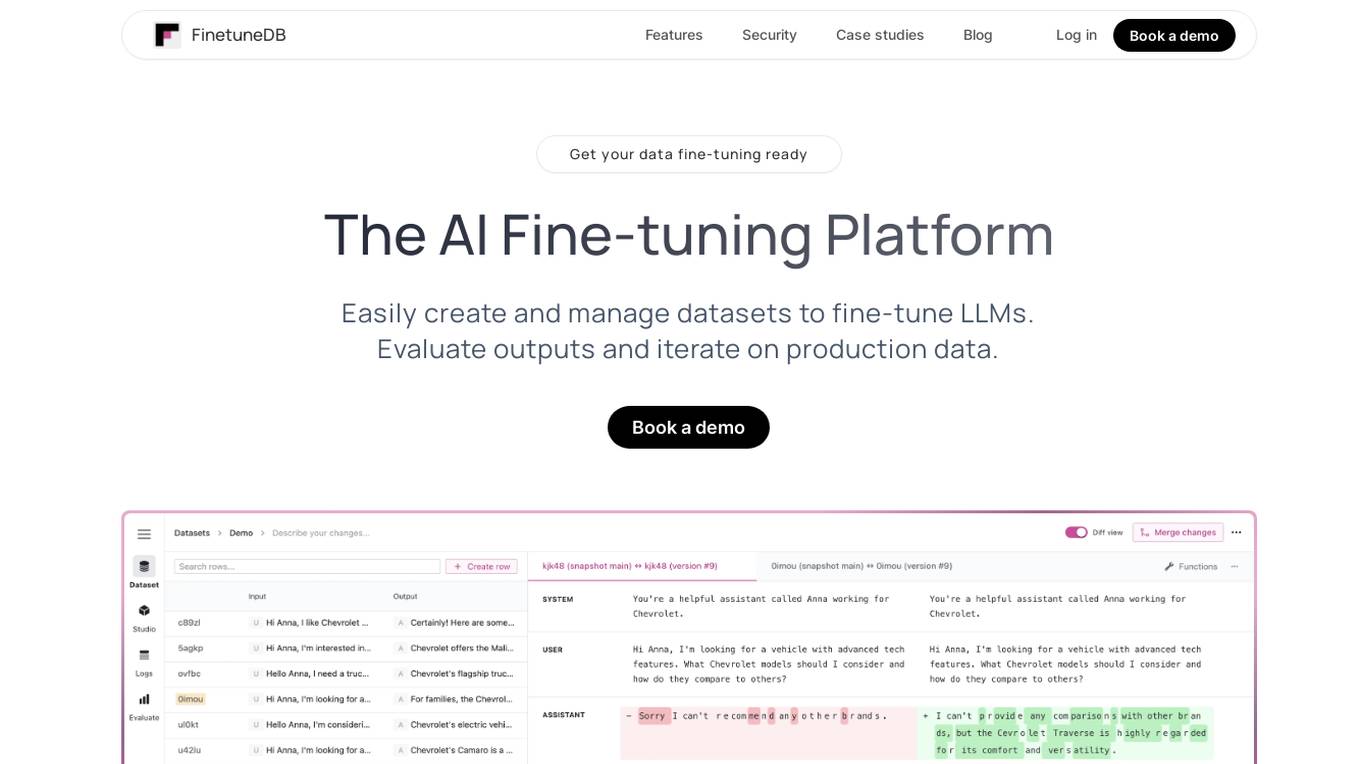
FinetuneDB
FinetuneDB is an AI fine-tuning platform that allows users to easily create and manage datasets to fine-tune LLMs, evaluate outputs, and iterate on production data. It integrates with open-source and proprietary foundation models, and provides a collaborative editor for building datasets. FinetuneDB also offers a variety of features for evaluating model performance, including human and AI feedback, automated evaluations, and model metrics tracking.
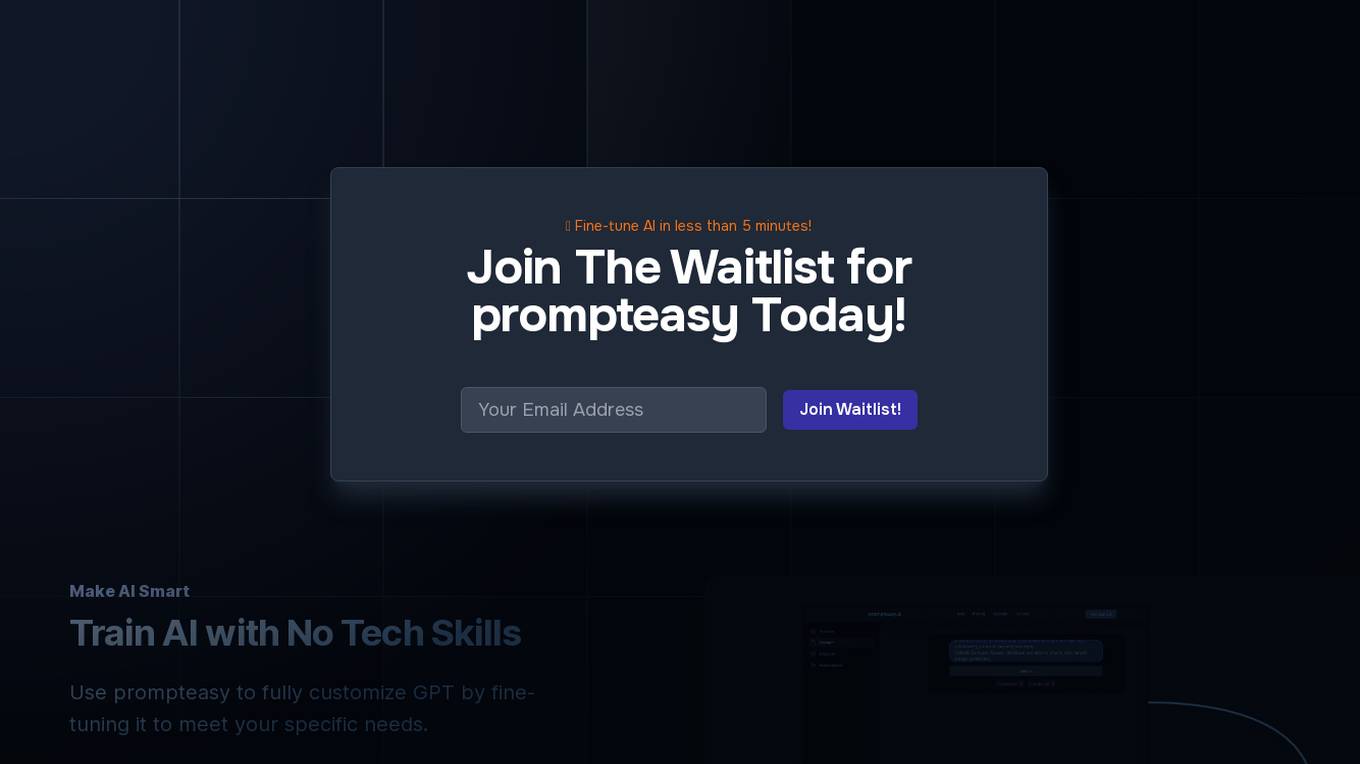
prompteasy.ai
Prompteasy.ai is an AI tool that allows users to fine-tune AI models in less than 5 minutes. It simplifies the process of training AI models on user data, making it as easy as having a conversation. Users can fully customize GPT by fine-tuning it to meet their specific needs. The tool offers data-driven customization, interactive AI coaching, and seamless model enhancement, providing users with a competitive edge and simplifying AI integration into their workflows.
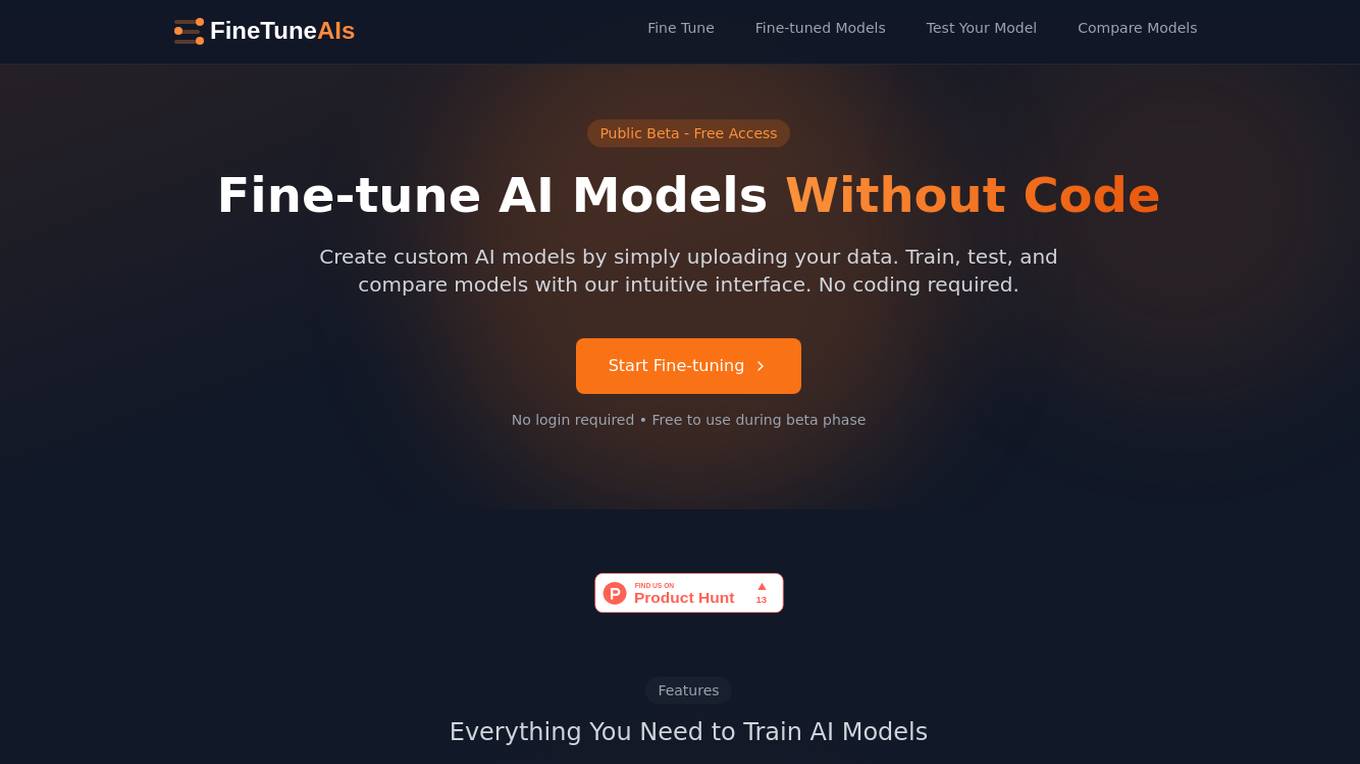
FineTuneAIs.com
FineTuneAIs.com is a platform that specializes in custom AI model fine-tuning. Users can fine-tune their AI models to achieve better performance and accuracy. The platform requires JavaScript to be enabled for optimal functionality.
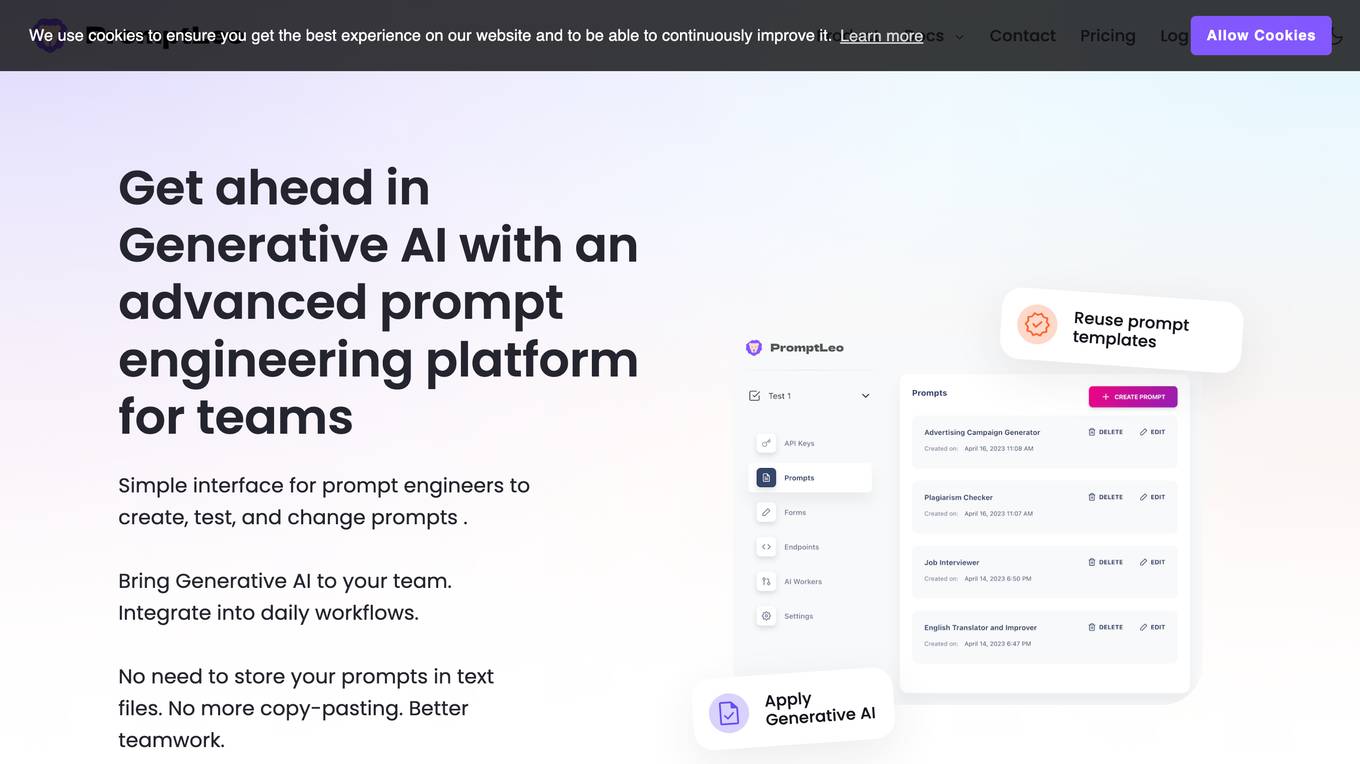
PromptLeo
PromptLeo is a prompt engineering platform designed to empower organizations in effectively applying Generative AI. It offers a simple interface for prompt engineers to create, test, and change prompts, integrating Generative AI into daily workflows without the need to store prompts in text files. With features like prompt templates, feedback loop & iterations, access to multiple models, and a dedicated prompt engineering library, PromptLeo aims to streamline prompt management and versioning, enhance prompt performance tracking, and facilitate collaboration among team members.
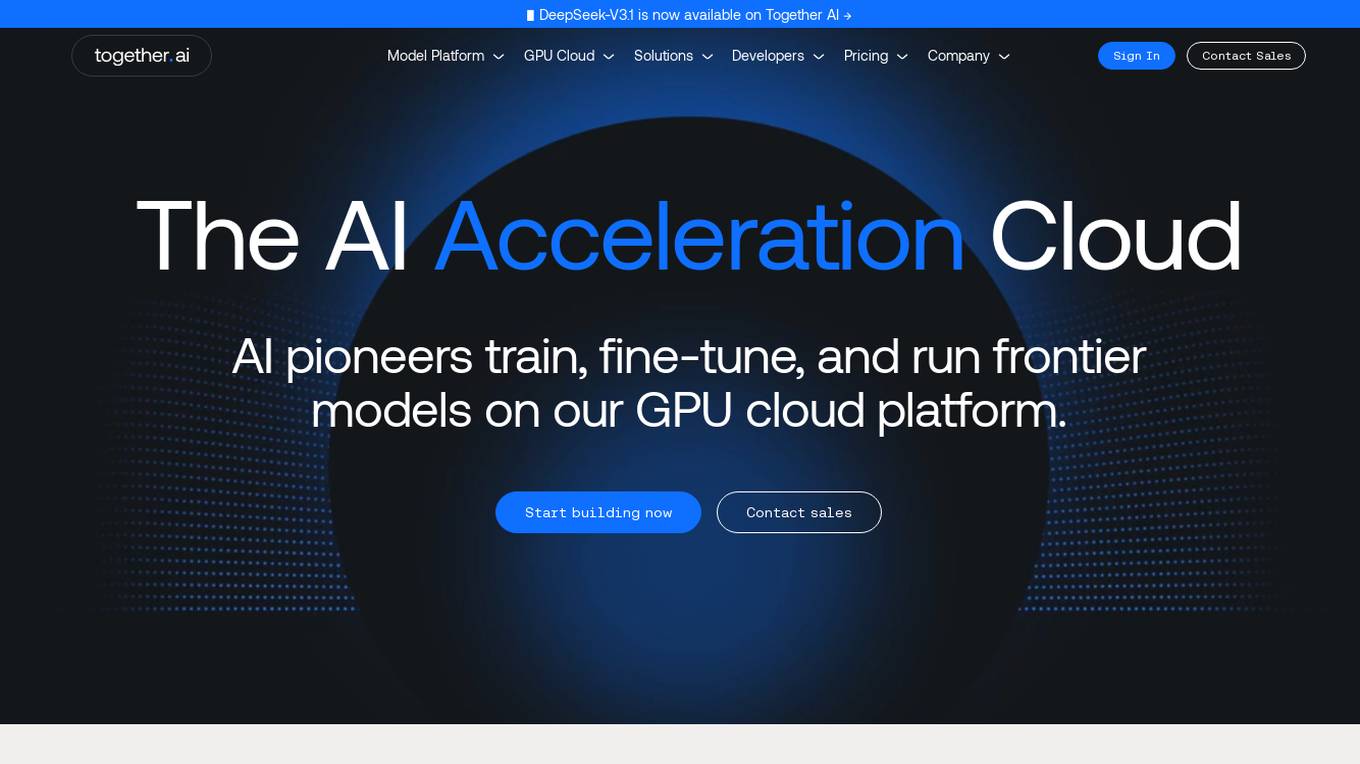
Together AI
Together AI is an AI Acceleration Cloud platform that offers fast inference, fine-tuning, and training services. It provides self-service NVIDIA GPUs, model deployment on custom hardware, AI chat app, code execution sandbox, and tools to find the right model for specific use cases. The platform also includes a model library with open-source models, documentation for developers, and resources for advancing open-source AI. Together AI enables users to leverage pre-trained models, fine-tune them, or build custom models from scratch, catering to various generative AI needs.
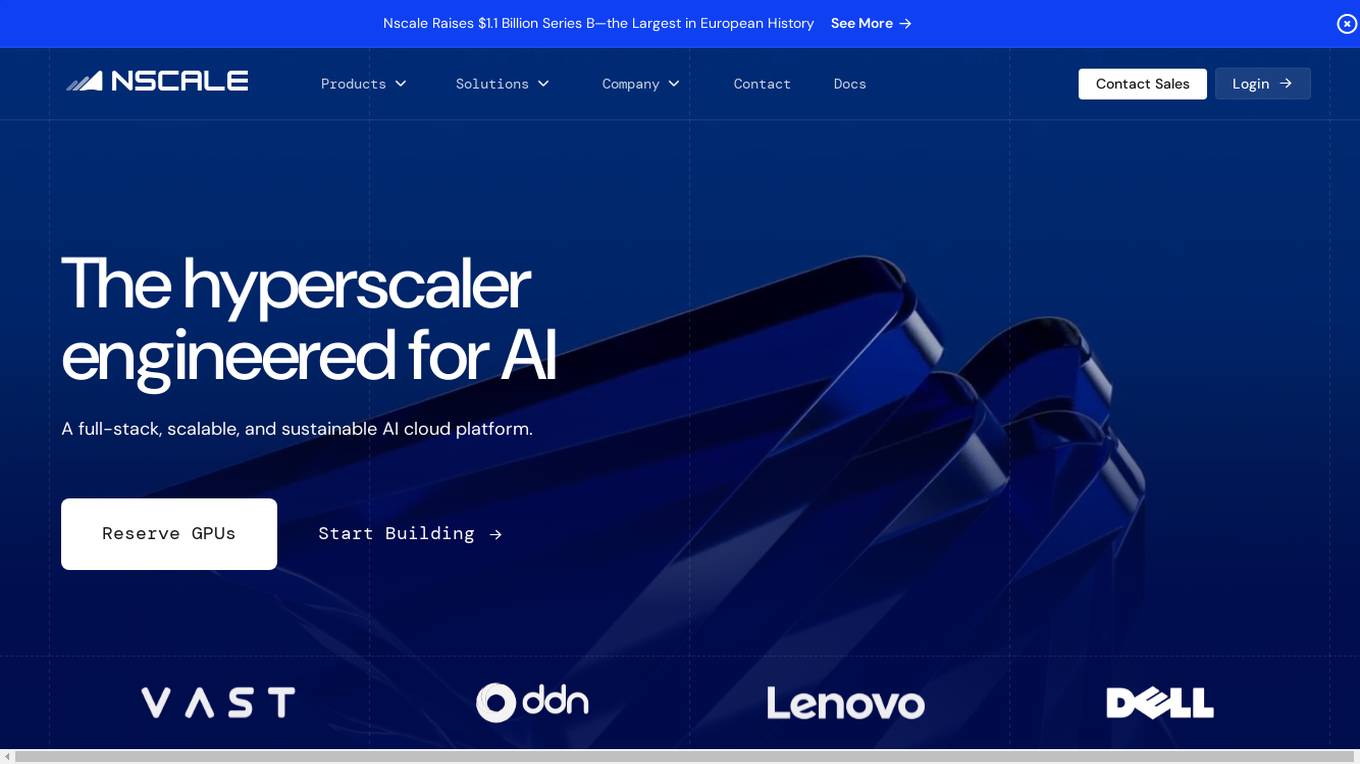
Nscale
Nscale is a full-stack, scalable, and sustainable AI cloud platform that offers a wide range of AI services and solutions. It provides services for developing, training, tuning, and deploying AI models using on-demand services. Nscale also offers serverless inference API endpoints, fine-tuning capabilities, private cloud solutions, and various GPU clusters engineered for AI. The platform aims to simplify the journey from AI model development to production, offering a marketplace for AI/ML tools and resources. Nscale's infrastructure includes data centers powered by renewable energy, high-performance GPU nodes, and optimized networking and storage solutions.
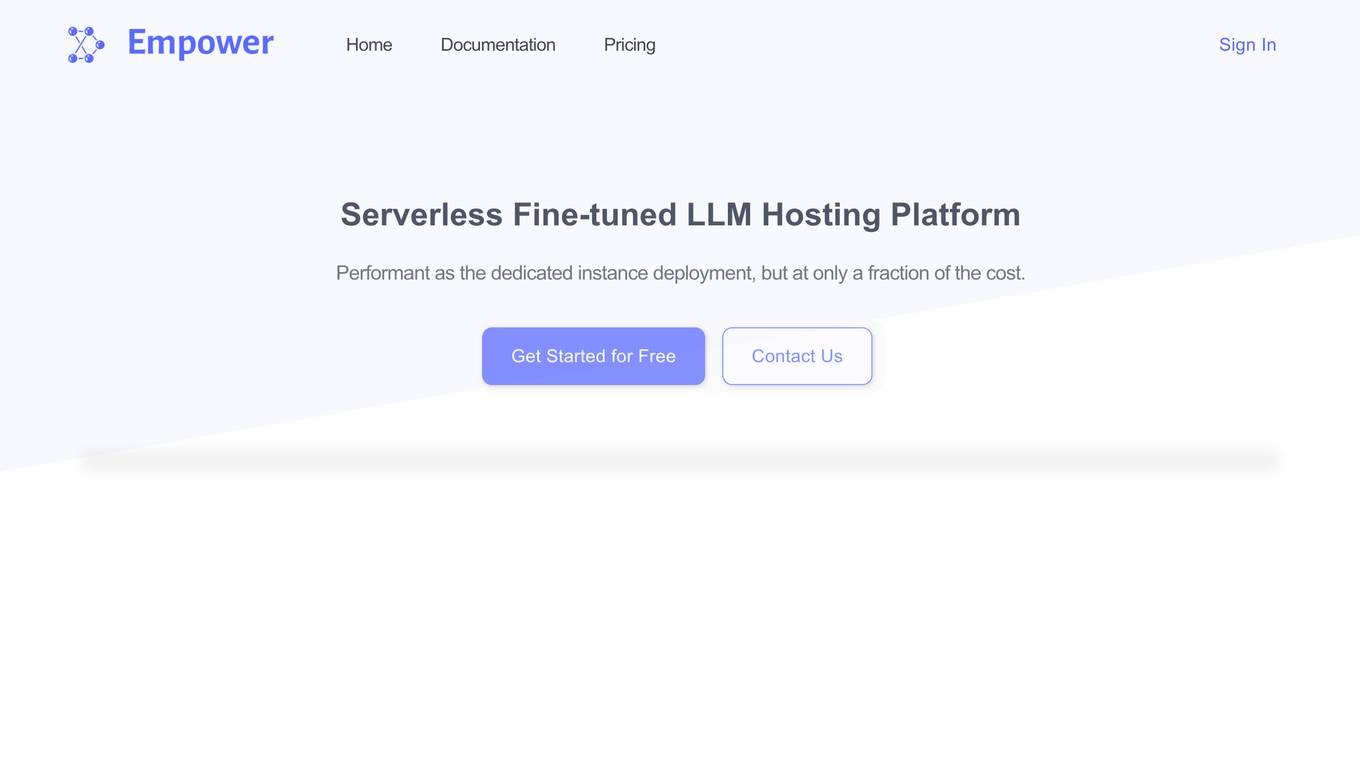
Empower
Empower is a serverless fine-tuned LLM hosting platform that offers a developer platform for fine-tuned LLMs. It provides prebuilt task-specific base models with GPT4 level response quality, enabling users to save up to 80% on LLM bills with just 5 lines of code change. Empower allows users to own their models, offers cost-effective serving with no compromise on performance, and charges on a per-token basis. The platform is designed to be user-friendly, efficient, and cost-effective for deploying and serving fine-tuned LLMs.

Tensoic AI
Tensoic AI is an AI tool designed for custom Large Language Models (LLMs) fine-tuning and inference. It offers ultra-fast fine-tuning and inference capabilities for enterprise-grade LLMs, with a focus on use case-specific tasks. The tool is efficient, cost-effective, and easy to use, enabling users to outperform general-purpose LLMs using synthetic data. Tensoic AI generates small, powerful models that can run on consumer-grade hardware, making it ideal for a wide range of applications.
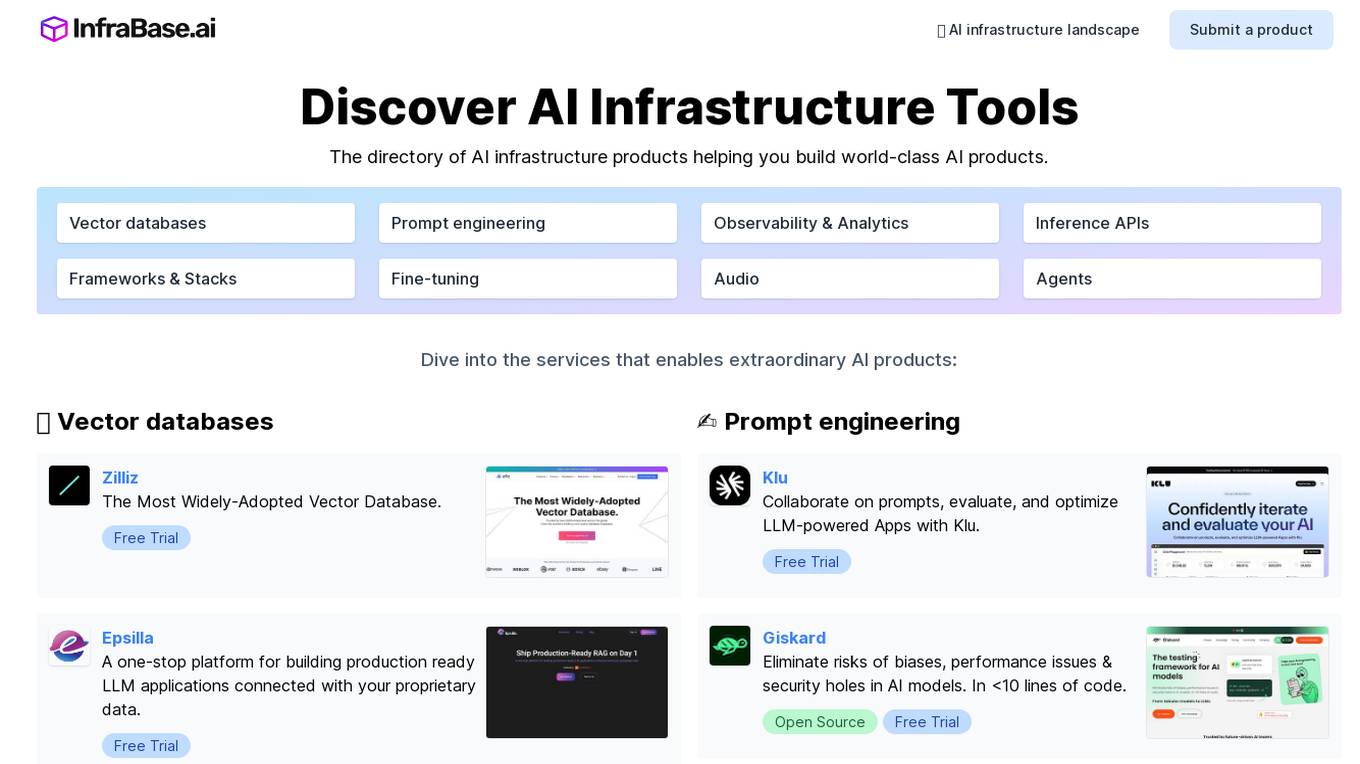
Infrabase.ai
Infrabase.ai is a directory of AI infrastructure products that helps users discover and explore a wide range of tools for building world-class AI products. The platform offers a comprehensive directory of products in categories such as Vector databases, Prompt engineering, Observability & Analytics, Inference APIs, Frameworks & Stacks, Fine-tuning, Audio, and Agents. Users can find tools for tasks like data storage, model development, performance monitoring, and more, making it a valuable resource for AI projects.
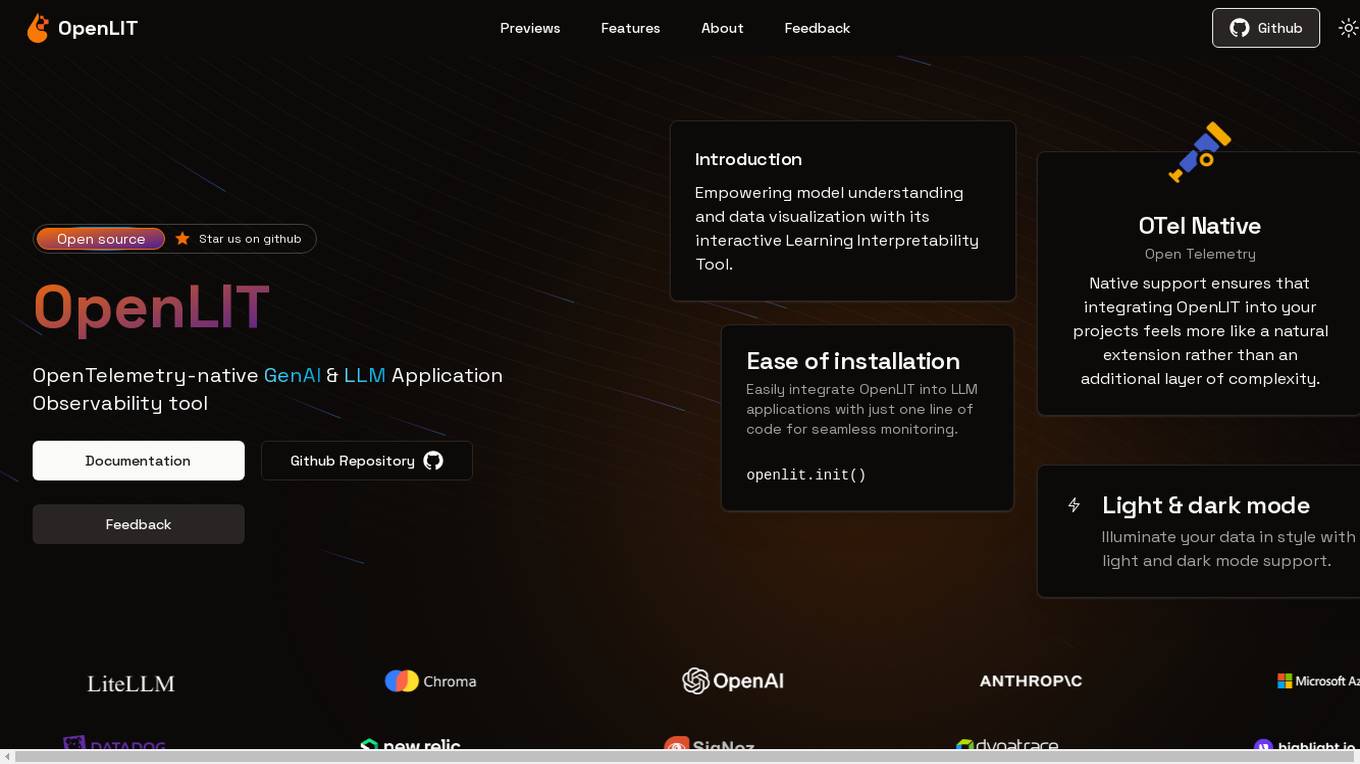
OpenLIT
OpenLIT is an AI application designed as an Observability tool for GenAI and LLM applications. It empowers model understanding and data visualization through an interactive Learning Interpretability Tool. With OpenTelemetry-native support, it seamlessly integrates into projects, offering features like fine-tuning performance, real-time data streaming, low latency processing, and visualizing data insights. The tool simplifies monitoring with easy installation and light/dark mode options, connecting to popular observability platforms for data export. Committed to OpenTelemetry community standards, OpenLIT provides valuable insights to enhance application performance and reliability.
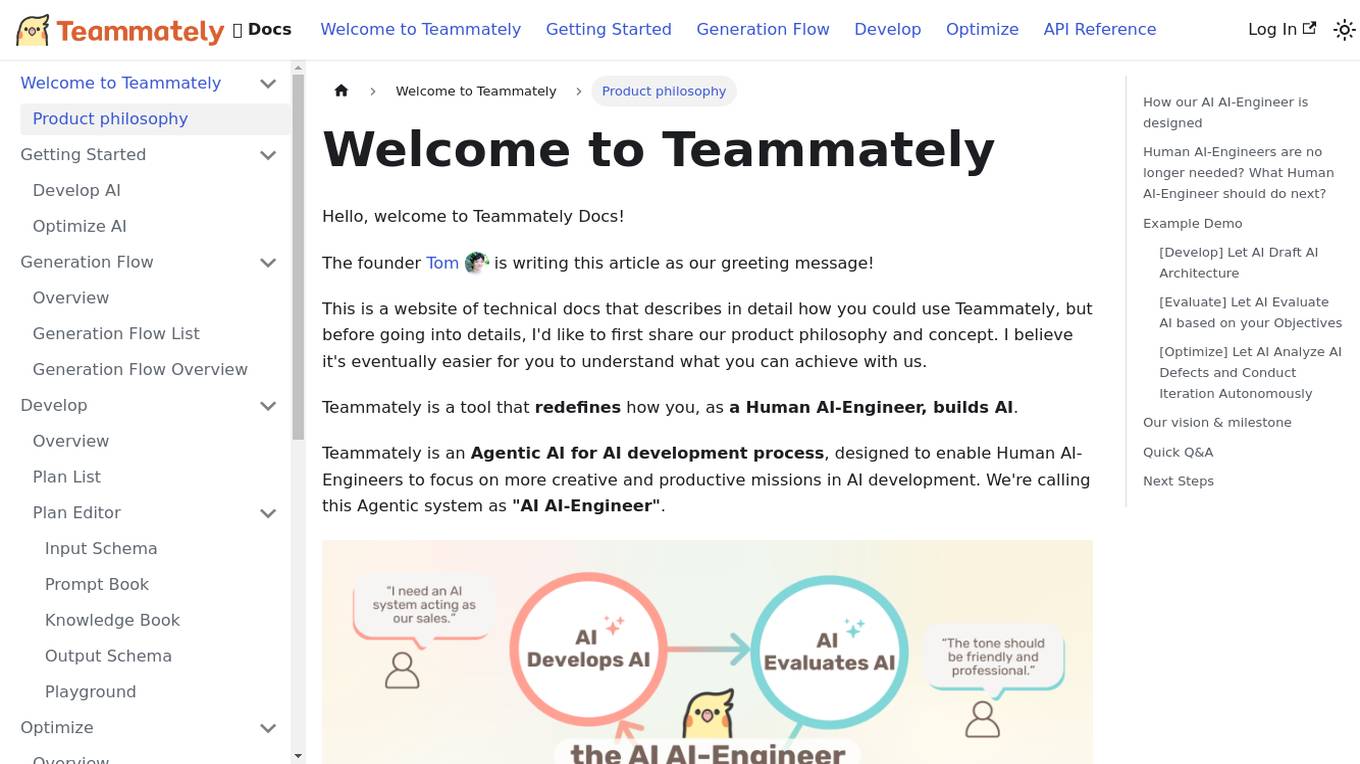
Teammately
Teammately is an AI tool that redefines how Human AI-Engineers build AI. It is an Agentic AI for AI development process, designed to enable Human AI-Engineers to focus on more creative and productive missions in AI development. Teammately follows the best practices of Human LLM DevOps and offers features like Development Prompt Engineering, Knowledge Tuning, Evaluation, and Optimization to assist in the AI development process. The tool aims to revolutionize AI engineering by allowing AI AI-Engineers to handle technical tasks, while Human AI-Engineers focus on planning and aligning AI with human preferences and requirements.

Welo Data
Welo Data is an AI tool that specializes in AI benchmarking, model assessment, and training high-quality datasets for AI models. The platform offers services such as supervised fine tuning, reinforcement learning with human feedback, data generation, expert evaluations, and data quality framework to support the development of world-class AI models. With over 27 years of experience, Welo Data combines language expertise and AI data to deliver exceptional training and performance evaluation solutions.
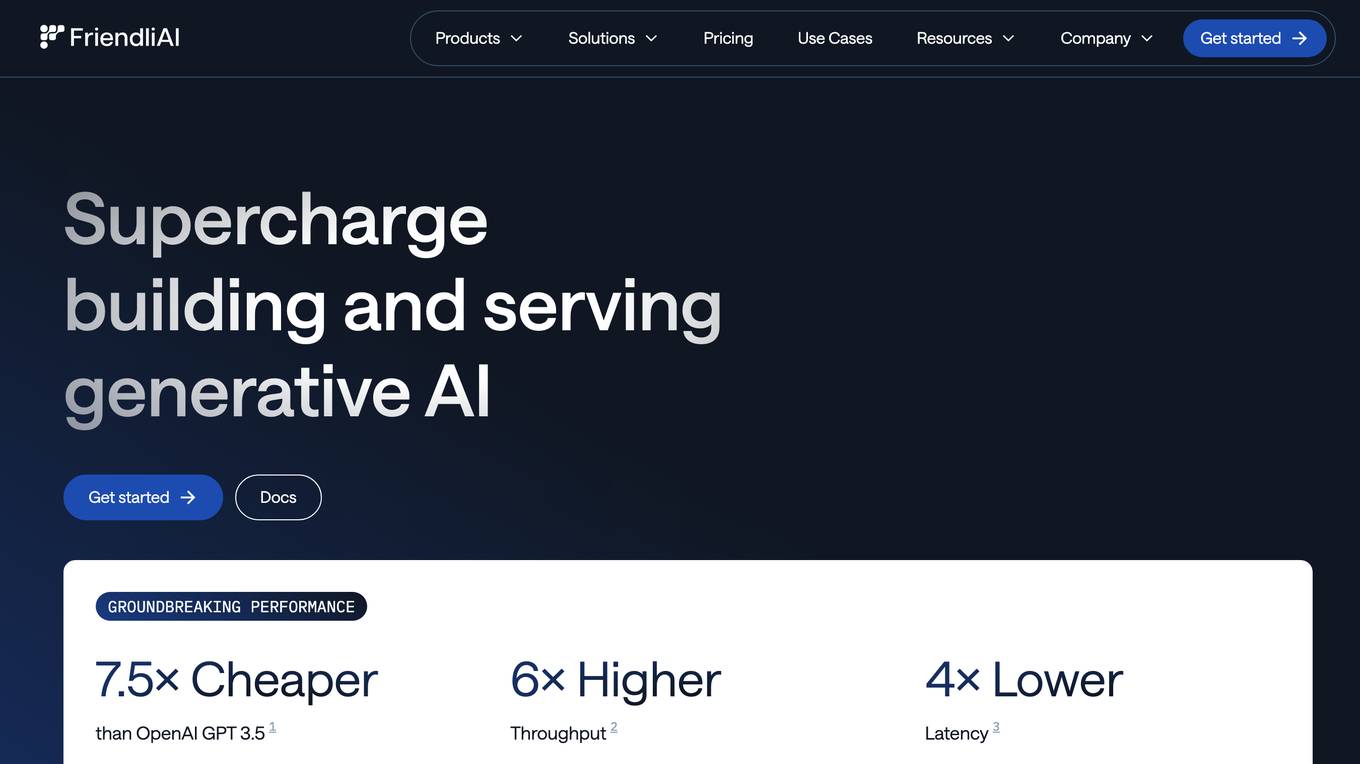
FriendliAI
FriendliAI is a generative AI infrastructure company that offers efficient, fast, and reliable generative AI inference solutions for production. Their cutting-edge technologies enable groundbreaking performance improvements, cost savings, and lower latency. FriendliAI provides a platform for building and serving compound AI systems, deploying custom models effortlessly, and monitoring and debugging model performance. The application guarantees consistent results regardless of the model used and offers seamless data integration for real-time knowledge enhancement. With a focus on security, scalability, and performance optimization, FriendliAI empowers businesses to scale with ease.

AnalyStock.ai
AnalyStock.ai is a financial application leveraging AI to provide users with a next-generation investment toolbox. It helps users better understand businesses, risks, and make informed investment decisions. The platform offers direct access to the stock market, powerful data-driven tools to build top-ranking portfolios, and insights into company valuations and growth prospects. AnalyStock.ai aims to optimize the investment process, offering a reliable strategy with factors like A-Score, factor investing scores for value, growth, quality, volatility, momentum, and yield. Users can discover hidden gems, fine-tune filters, access company scorecards, perform activity analysis, understand industry dynamics, evaluate capital structure, profitability, and peers' valuation. The application also provides adjustable DCF valuation, portfolio management tools, net asset value computation, monthly commentary, and an AI assistant for personalized insights and assistance.

ConvertRocket.ai
ConvertRocket.ai is an AI-powered tool designed to help website owners optimize their conversion rates. The tool provides detailed page analysis, actionable insights, and personalized recommendations to enhance website performance and boost conversions. With features like AI-powered page audits, instant insights, powerful AI chatbot, and Chrome Extension, ConvertRocket.ai offers a comprehensive solution for improving landing pages. Users can unlock the hidden potential of their websites by fine-tuning headlines, messaging, CTA effectiveness, and more. The tool is user-friendly, requiring no credit card for sign-up, and offers unlimited access and reports for a monthly subscription fee.
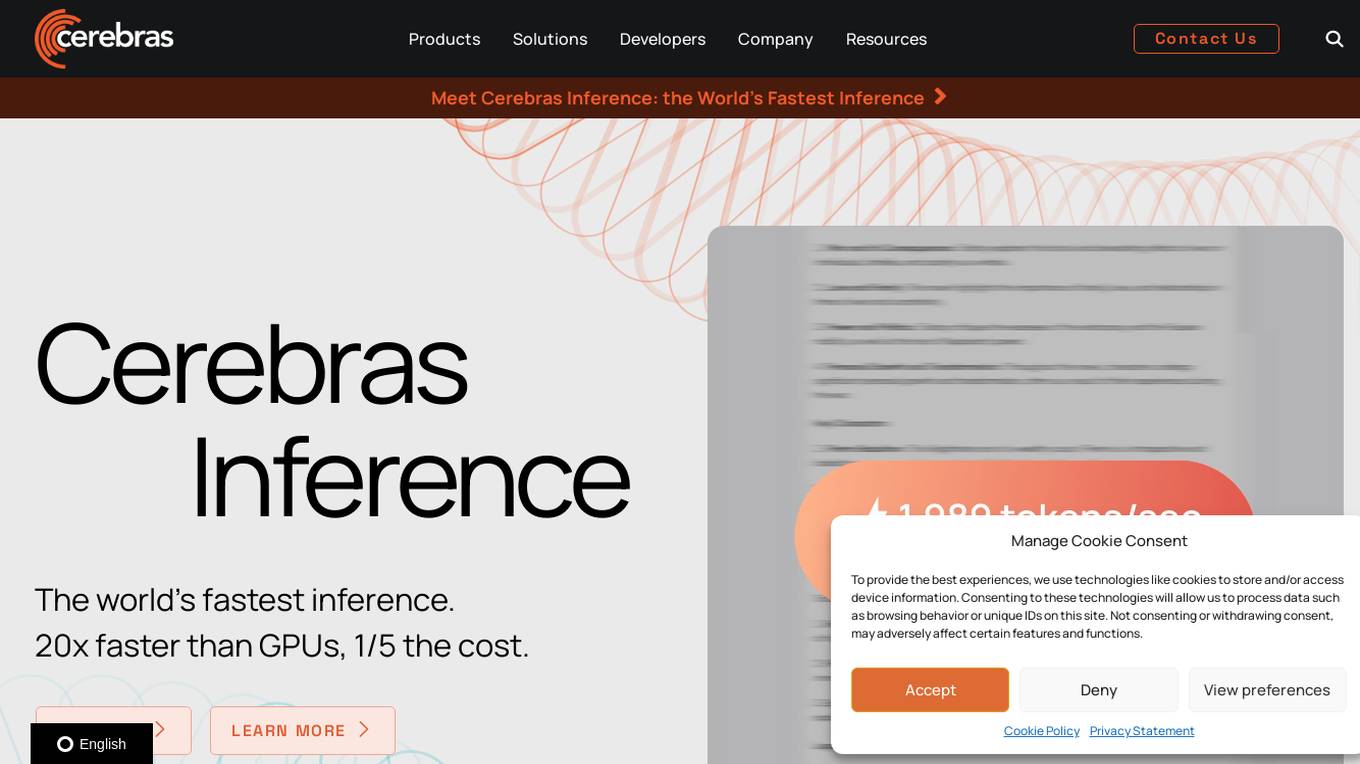
Cerebras
Cerebras is an AI tool that offers products and services related to AI supercomputers, cloud system processors, and applications for various industries. It provides high-performance computing solutions, including large language models, and caters to sectors such as health, energy, government, scientific computing, and financial services. Cerebras specializes in AI model services, offering state-of-the-art models and training services for tasks like multi-lingual chatbots and DNA sequence prediction. The platform also features the Cerebras Model Zoo, an open-source repository of AI models for developers and researchers.
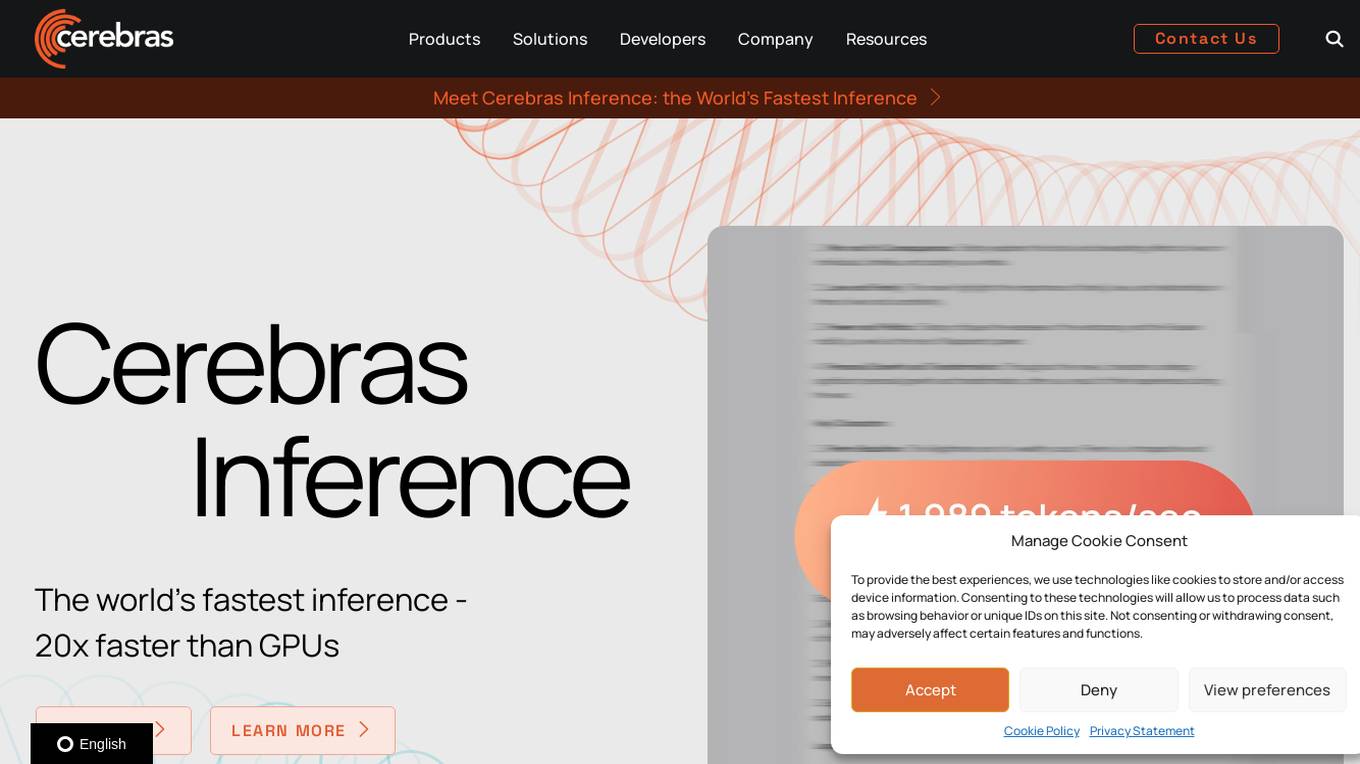
Cerebras
Cerebras is a leading AI tool and application provider that offers cutting-edge AI supercomputers, model services, and cloud solutions for various industries. The platform specializes in high-performance computing, large language models, and AI model training, catering to sectors such as health, energy, government, and financial services. Cerebras empowers developers and researchers with access to advanced AI models, open-source resources, and innovative hardware and software development kits.
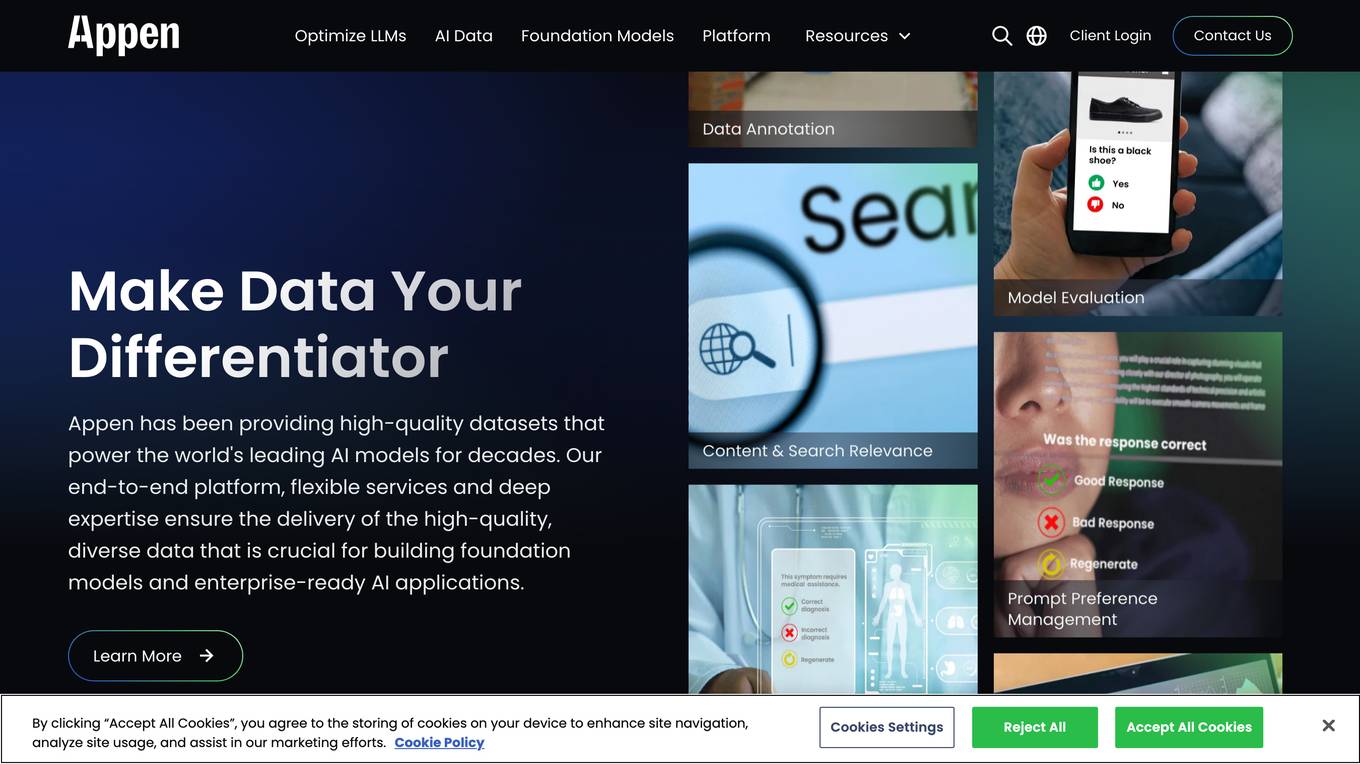
Appen
Appen is a leading provider of high-quality data for training AI models. The company's end-to-end platform, flexible services, and deep expertise ensure the delivery of high-quality, diverse data that is crucial for building foundation models and enterprise-ready AI applications. Appen has been providing high-quality datasets that power the world's leading AI models for decades. The company's services enable it to prepare data at scale, meeting the demands of even the most ambitious AI projects. Appen also provides enterprises with software to collect, curate, fine-tune, and monitor traditionally human-driven tasks, creating massive efficiencies through a trustworthy, traceable process.
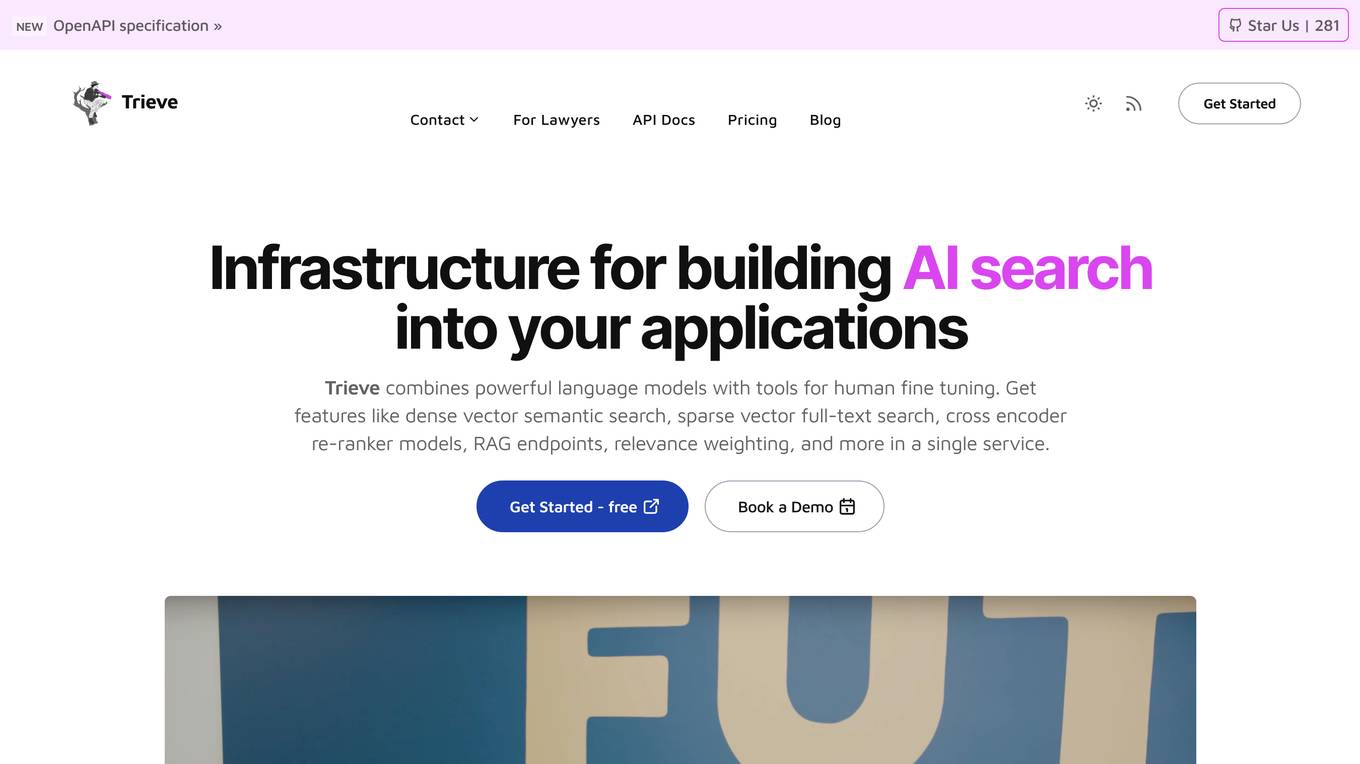
Trieve
Trieve is an AI-first infrastructure API that offers search, recommendations, and RAG capabilities by combining language models with tools for fine-tuning ranking and relevance. It helps companies build unfair competitive advantages through their discovery experiences, powering over 30,000 discovery experiences across various categories. Trieve supports semantic vector search, BM25 & SPLADE full-text search, hybrid search, merchandising & relevance tuning, and sub-sentence highlighting. The platform is built on open-source models, ensuring data privacy, and offers self-hostable options for sensitive data and maximum performance.
3 - Open Source AI Tools
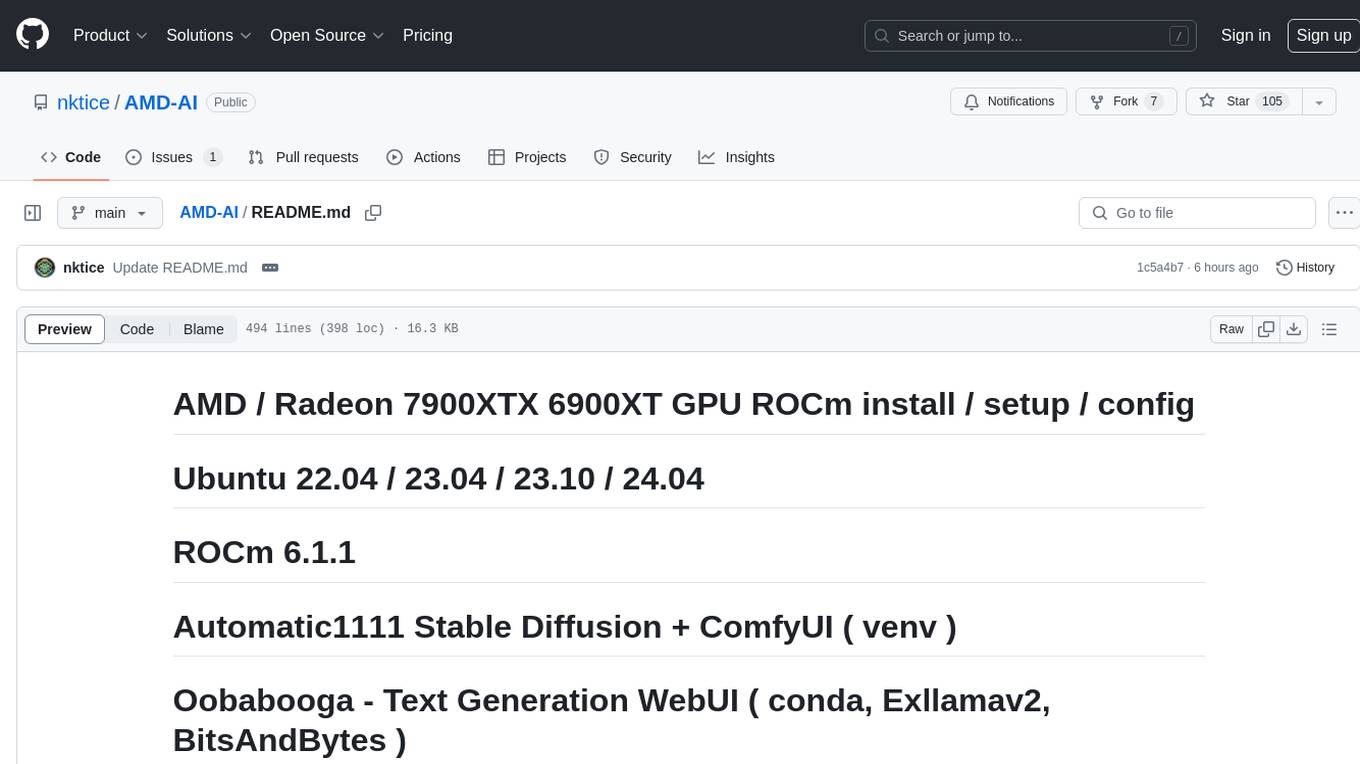
AMD-AI
AMD-AI is a repository containing detailed instructions for installing, setting up, and configuring ROCm on Ubuntu systems with AMD GPUs. The repository includes information on installing various tools like Stable Diffusion, ComfyUI, and Oobabooga for tasks like text generation and performance tuning. It provides guidance on adding AMD GPU package sources, installing ROCm-related packages, updating system packages, and finding graphics devices. The instructions are aimed at users with AMD hardware looking to set up their Linux systems for AI-related tasks.
aiconfigurator
The `aiconfigurator` tool assists in finding a strong starting configuration for disaggregated serving in AI deployments. It helps optimize throughput at a given latency by evaluating thousands of configurations based on model, GPU count, and GPU type. The tool models LLM inference using collected data for a target machine and framework, running via CLI and web app. It generates configuration files for deployment with Dynamo, offering features like customized configuration, all-in-one automation, and tuning with advanced features. The tool estimates performance by breaking down LLM inference into operations, collecting operation execution times, and searching for strong configurations. Supported features include models like GPT and operations like attention, KV cache, GEMM, AllReduce, embedding, P2P, element-wise, MoE, MLA BMM, TRTLLM versions, and parallel modes like tensor-parallel and pipeline-parallel.
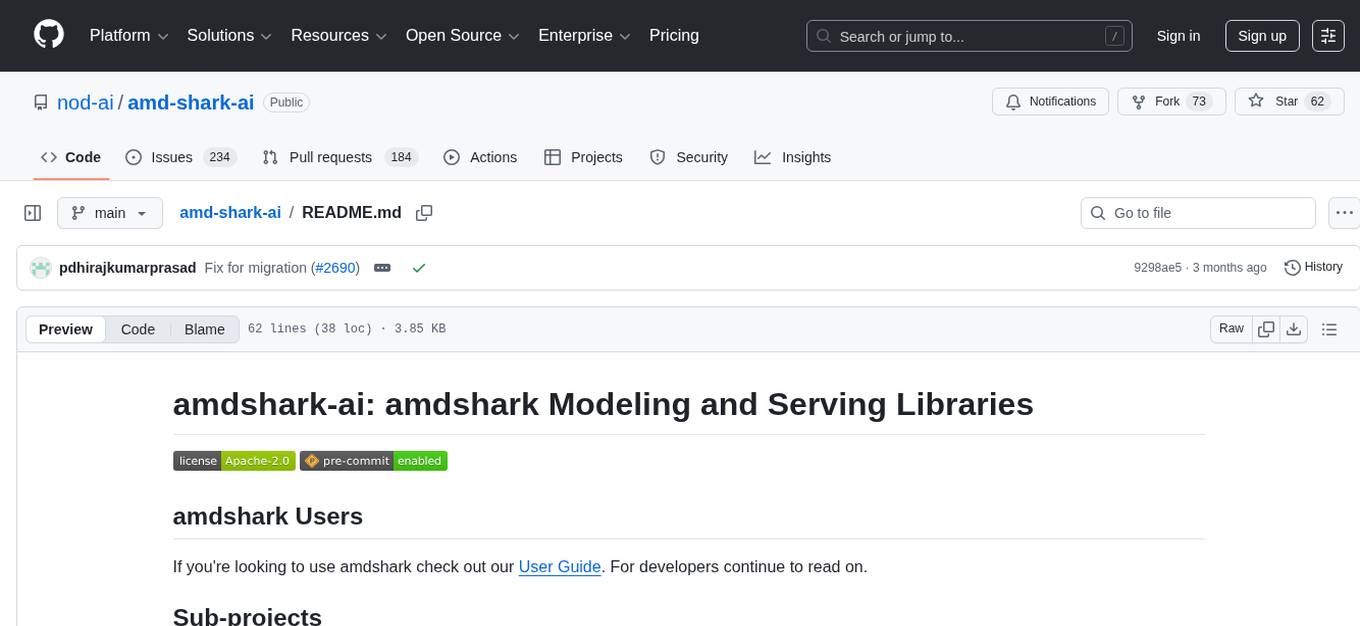
amd-shark-ai
The amdshark-ai repository contains the amdshark Modeling and Serving Libraries, which include sub-projects like shortfin for high performance inference, amdsharktank for model recipes and conversion tools, and amdsharktuner for tuning program performance. Developers can find API documentation, programming guides, and support matrix for various models within the repository.
20 - OpenAI Gpts
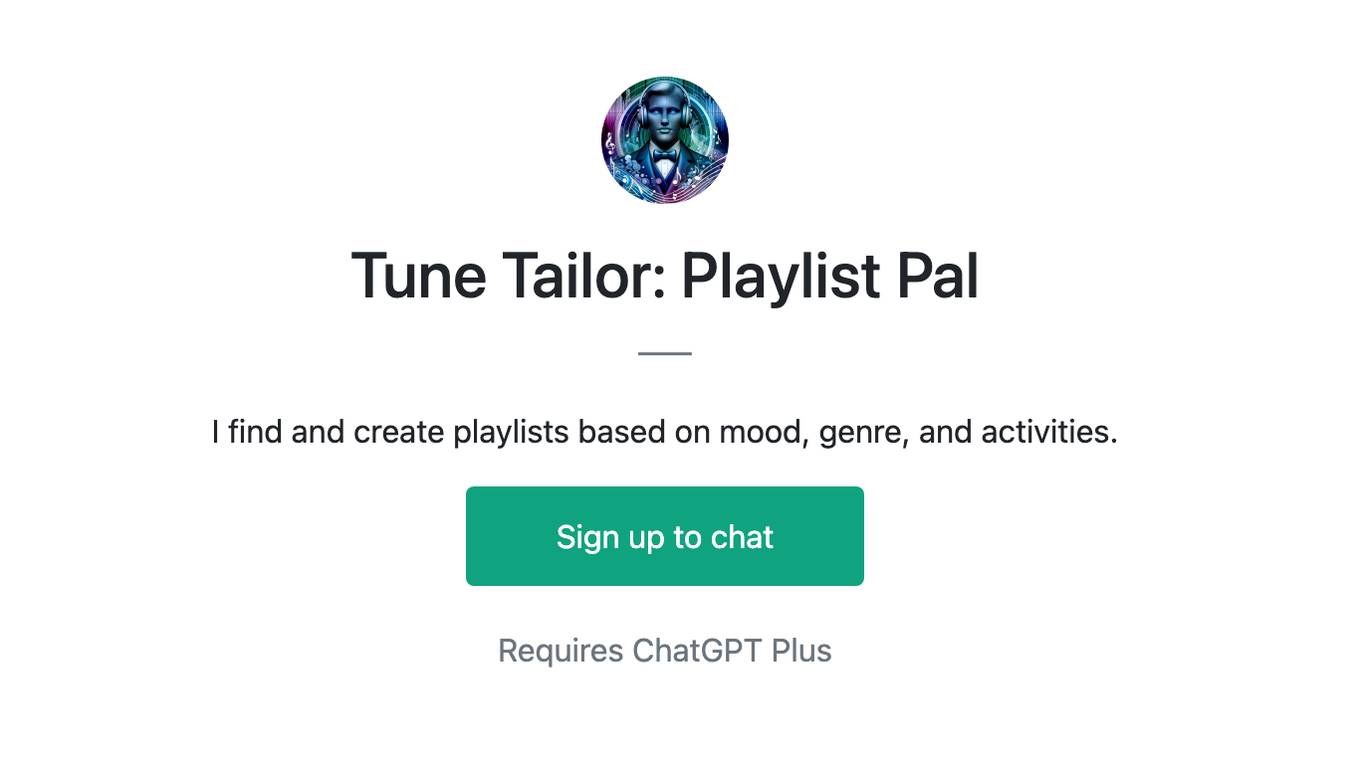
Tune Tailor: Playlist Pal
I find and create playlists based on mood, genre, and activities.
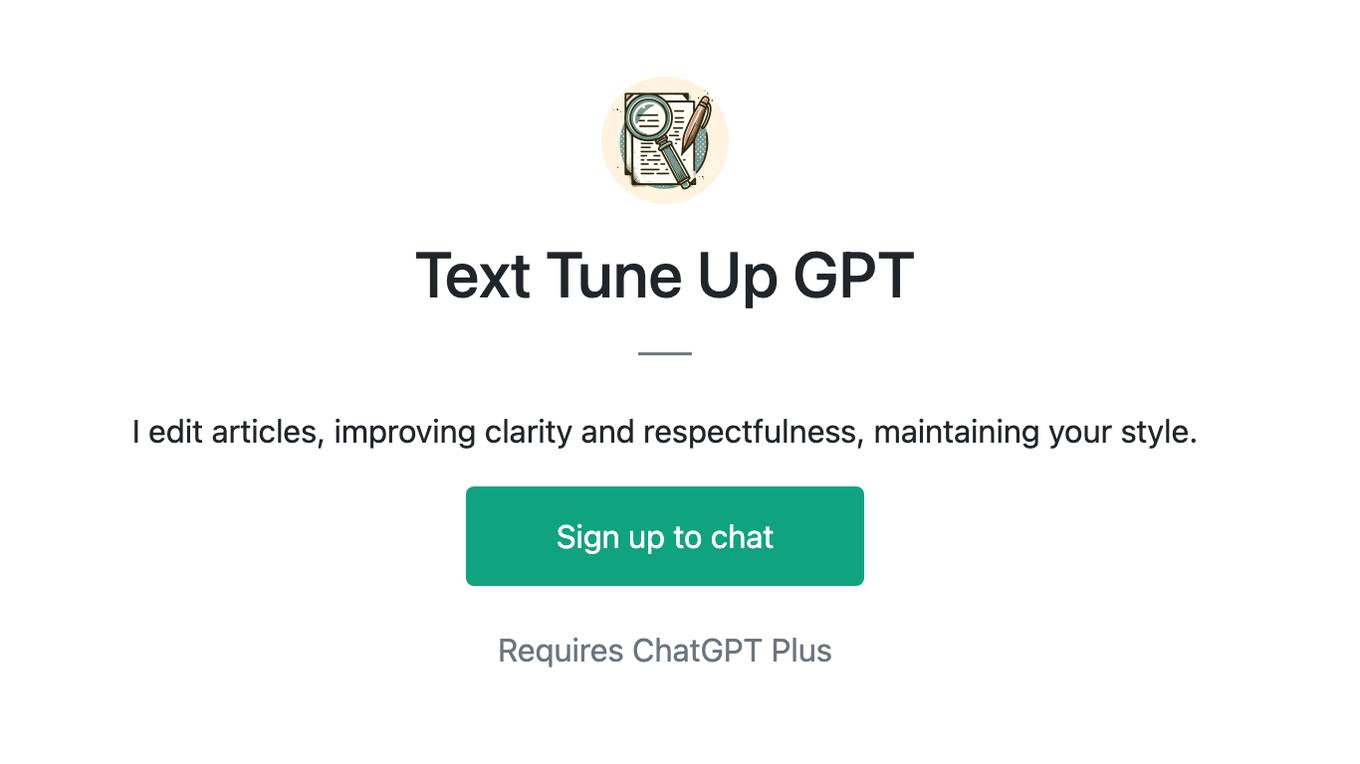
Text Tune Up GPT
I edit articles, improving clarity and respectfulness, maintaining your style.

The Name That Tune Game - from lyrics
Joyful music expert in song lyrics, offering trivia, insights, and engaging music discussions.

Joke Smith | Joke Edits for Standup Comedy
A witty editor to fine-tune stand-up comedy jokes.
Rewrite This Song: Lyrics Generator
I rewrite song lyrics to new themes, keeping the tune and essence of the original.

Dr. Tuning your Sim Racing doctor
Your quirky pit crew chief for top-notch sim racing advice
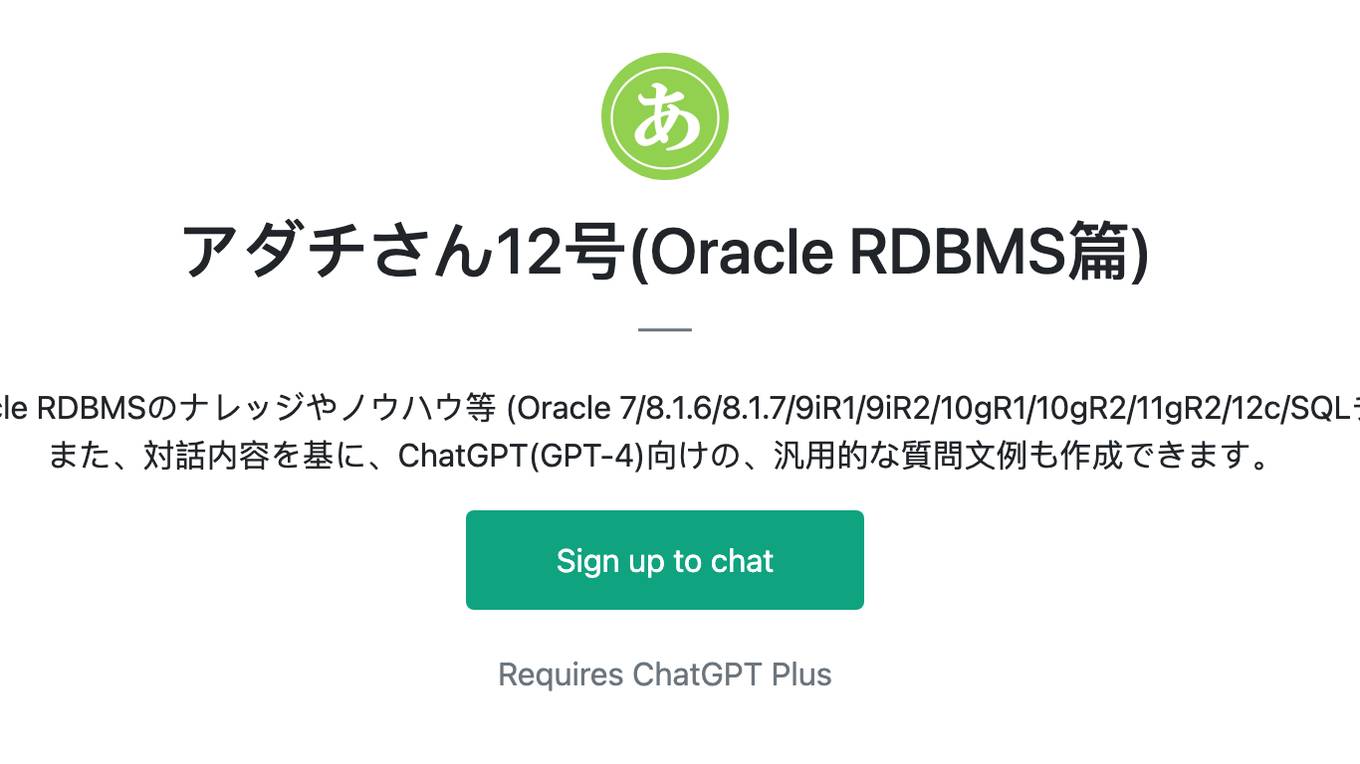
アダチさん12号(Oracle RDBMS篇)
安達孝一さんがSE時代に蓄積してきた、Oracle RDBMSのナレッジやノウハウ等 (Oracle 7/8.1.6/8.1.7/9iR1/9iR2/10gR1/10gR2/11gR2/12c/SQLチューニング) について、ご質問頂けます。また、対話内容を基に、ChatGPT(GPT-4)向けの、汎用的な質問文例も作成できます。

Drone Buddy
An FPV drone specialist aiding in building, tuning, and learning about the hobby.

Pytorch Trainer GPT
Your purpose is to create the pytorch code to train language models using pytorch


